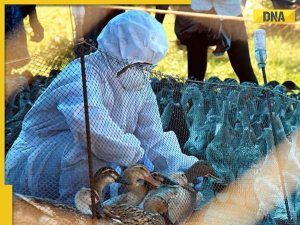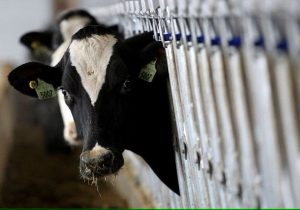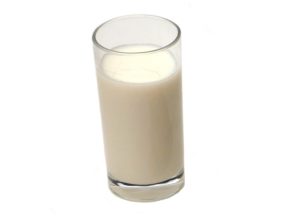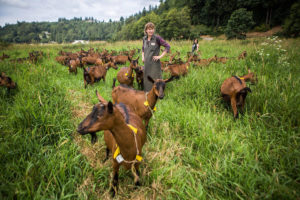The farm’s owners hoped to start making cheese again last spring but chose to wait as Covid-19 entered Vermont, battering the state’s dairy industry and the world’s cheese market. Now, Consider Bardwell is making a measured return by producing several of its signature raw cows’ cheeses in small batches. In the past, the farm was known for its goat cheese, too.
“I was so bereft over something that I loved — and that was so well-appreciated nationally — coming to an end,” Angela Miller, one of Consider Bardwell’s co-owners, said of the farm’s closure. “To suddenly have that stop was ultimately not acceptable.”
In September 2019, the dairy farm shut down after finding listeria monocytogenes — a bacteria that the Centers for Disease Control and Prevention warns can cause serious illness — in some of its raw milk cheese. Around one in five people infected by listeria die, according to the CDC.
Food safety recalls are common occurrences in Vermont, but state dairy officials said the Consider Bardwell case was the first appearance of listeria in a Vermont dairy farm’s product in decades.
The farm’s struggles after the listeria scare illustrated the existential threat such food safety incidents can pose to dairy operations, especially small ones.
Of its own volition, Consider Bardwell’s staff recalled two of its popular raw cheeses and one pasteurized cheese. That entailed destroying hundreds of thousands of dollars’ worth of those products, which the farm had previously distributed to Whole Foods and other major food outlets around the country. The farm had to let most of its employees go, too.
“I think I’m finally past the PTSD” of that experience, Miller said.
‘Proactive and over-cautious’
While they took a heavy toll on the farm’s staff, the stringent safety protocols also paid off. State officials who work in the dairy sector and members of the dairy community were impressed by how swiftly Consider Bardwell took measures to mitigate the situation. None of the contaminated products made it into consumers’ hands, officials said at the time.
“Angela and Consider Bardwell did a really great job as far as their recall,” Kate Turcotte, Shelburne Farms’ head cheesemaker, told VTDigger after the recall. “They were incredibly proactive and over-cautious.”
The farm has run a significantly scaled-down operation compared to past years since it resumed making cheese in February. Miller calls it “taking baby steps.”
In a typical year before the listeria scare, a 20-person staff would produce around 120,000 pounds of cheese, which was popular among fancy cheese stores and restaurants around the country. This year, a staff of six — including Miller — will make one-fourth that amount, she estimated, as the cheese-making industry continues to battle the effects of the pandemic-induced recession.
As Covid-19 has forced some Vermont dairy farms to dump milk and others to shut their doors, some producers have found that turning to local markets has helped. Butter makers and organic milk producers have observed spikes in local demand for their products as people have cooked more at home than ever.
Because Consider Bardwell’s cheese is higher-end, Miller isn’t sure that the same local demand will arise for its products. But the farm is still trying to think more locally now than it might have in the past by mostly distributing to New England rather than the entire country.
‘A renewal and a rebirth’
The farm had to sell its goat herd after the recall and is only producing cows’ milk cheese at the moment, offering two raw milk cheeses and one pasteurized cheese. Miller got some of her goats back last weekend, though, and hopes to begin making goat cheese again by next year.
Customers should not be deterred from buying Consider Bardwell’s cheese in light of the 2019 incident, said E.B. Flory, dairy program section chief for Vermont’s Agency of Agriculture, Food and Markets.
The farm “was approved to begin manufacturing cheese again after in-depth environmental testing was conducted,” Flory told VTDigger in an email. “With guidance from the [federal] Food and Drug Administration and the Vermont Agency of Agriculture, Consider Bardwell has addressed all the factors that may have caused the issue in 2019.”
Consider Bardwell’s five-year plan is to ramp up production eventually to around 60,000 pounds of cheese per year. While that’s still only half of what the farm would have made in past years, Miller is mostly grateful to have her farm back.
“I feel as if I am enjoying a renewal and a rebirth,” she said, “and as if I am appreciating all of this much more than ever.”








